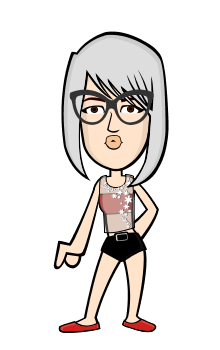As technology evolved, lots of gadgets are being made available to heal or cure the sick starting from `early detection machines` to anything that technology could possibly do. Seldom would people think about doing the alternative. People tend to panic and go with the trend whichever is the latest, that, they think is well.
I would like to inform or share to others some possible ways that people could do without spending a lot of money on machines.
Introducing REFLEXOLOGY. Reflex (as to what it is commonly called) is a method of relieving pain or curing illness by pressing on particular parts of a person’s hands or feet (Source: Merriam-webster dictionary).
In our body, we have this so called ’Reflex-Zones’. Reflex zones are nerve points, each of which is in communication with each other, distant parts of the body. These reflex zones are found through-out the body. Most of the reflex zones are found in the feet which might be the intended reason for all humans to go barefoot but because our environment has changed, we wear shoes. Sad to say, sometimes we wear the wrong shoes. Because of doing so, the blood circulation is choked and cut off resulting to cold feet or worse, badly circulated reflex-zones which can no longer carry out its duties properly.
How does reflex works?
Through massage of the reflex-zone, we get better circulation of both the zone and the organ related to it. As to how and why it works, it hasn’t been scientifically explained yet-but it does work. One example for it is to massage the middle toe (in one of your feet) and soon you’ll find that the middle finger (as its reflex zone) is suddenly the warmest finger of the hand (the best circulation). You can try it now.
The importance of blood circulation:
The circulation is vital to every organ since it is the medium transport of: Nutrients (anabolic substances), Oxygen, Hormones, Antibodies, and Waste (Catabolic substances). Whatever the disturbance or injury to the organism (whether organs or musculature) it can only be completely cured through the circulation. It only means that the better the blood circulation, the quicker the healing process. When circulation is poor, healing often takes a long, long time.
What disturbs our reflex-zones?
If we press a reflex zone, we often detect more or less hard areas. These are the so called ’Deposits ’ or the formation of uric acid and other sedimentary materials. Deposits begin or exclusively forms at spots where the blood circulation is somehow disturbed. Both or either of the reflex zone or organs are the first to be disturbed. For example, there is an accident. In the accident the organ was affected and not ten minutes later, the reflex zone, informed of the disturbance, suddenly reacted to pressure with pain. Sometimes reflex is the one to be disturbed first (shoes) resulting in a negative effect of the working efficiency of the organ. In the reflex zone, even the smallest disturbance is recorded and the best solution to avoid disturbance is to prevent it.
How to do the reflex.
There are two basic ways to do reflex:
- Manual Massage
- Step Massage
In manual massage, the masseur and the subject should sit comfortably and relaxed as possible.
Massage Position for all reflex zones in the sole of the foot:
- The foot of the person being massaged should be laid on the masseurs knee so that the latter has the sole free open before him.
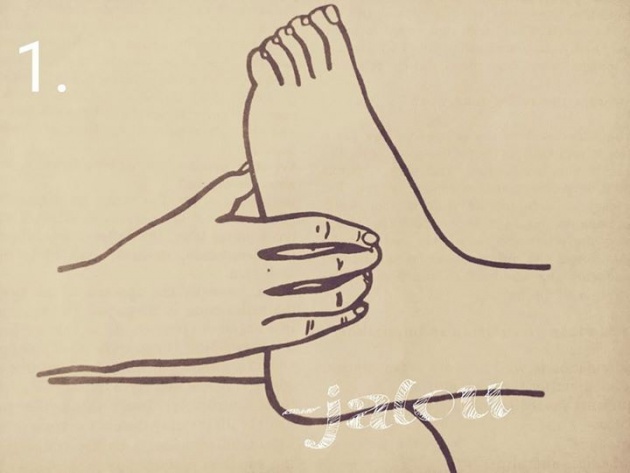
Massage position for the reflexes in the region of the toes and metatarsal bone:
- The subject bends his leg, places the foot flat on masseur’s knee.
Massage Position for all reflex on the heels, around the ankles and the bones round about:
- The subject turns himself to one side and the masseur holds, depending on the reflex-point being massaged, the inner or outer side of the foot.
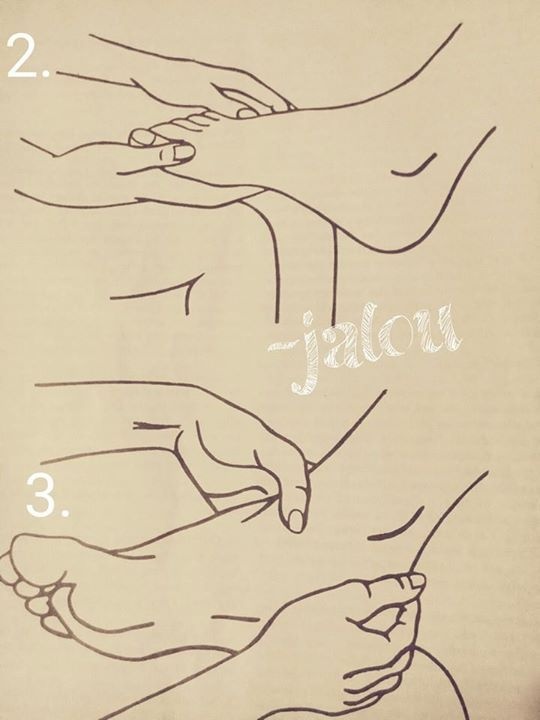
In step massage, we should tread barefoot over rough ground, sticks and stones. That way, the foot automatically received reflex-zone massage. We can do the same today or every day. We can use body roller or pressure wood, whichever you desire.
Where to begin the massage.
Below are the pictures as to where to press/massage so that we can retain the best blood circulation in our body.
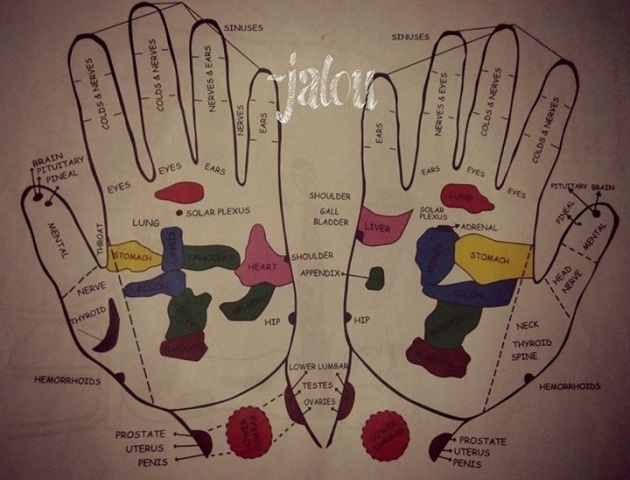
Right Foot:
- Head (Cerebrum), left half.
- Frontal Sinuses, left half
- Brain stem, cerebellum
- Pituitary
- Temple, left, trigeminal nerve
- Nose
- Neck
- Eye, left
- Ear, left
- Shoulder, right
- Trapezoid musculature, right
- Thyroid glands
- Parathyroid glands
- Lungs and bronchi, right
- Stomach
- Duodenum
- Pancreas
- Liver
- Gall-bladder
- Solar plexus
- Adrenal glands, right
- Kidney, right
- Ureter, right
- Bladder
- Small intestines
- Appendix, vermicular appendix
- Ileocecal valve
- Ascending colon
- Transverse colon
- Knee, right
- Genetial glands (ovaries/testicles), right
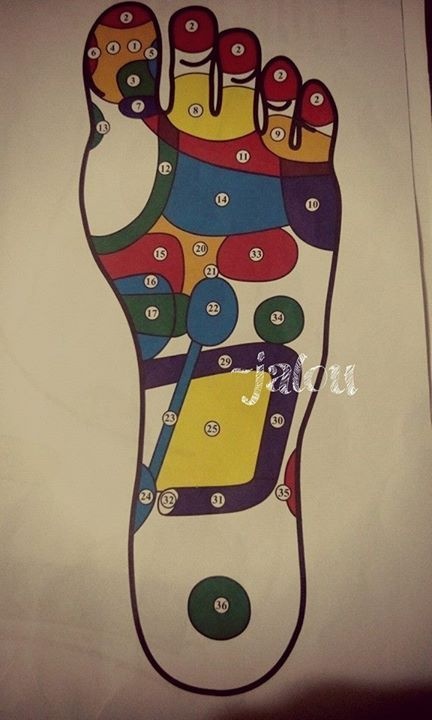
Left Foot:
- Head (cerebrum), right
- Frontal sinuses, right half
- Brain-stem, cerebellum
- Pituitary
- Teple, right, trigeminal nerve
- Nose
- Neck
- Eye, right
- Ear, right
- Shoulder, left
- Trapezoid masculature, left
- Thyroid glands
- Parathyroid glands
- Lungs, bronchi, left
- Stomach
- Doudenum
- Pancreas
- -
- -
- Solar plexus
- Adrenal glands, left
- Kidney, left
- Ureter, left
- Bladder
- Small Intestine
- -
- -
- -
- Transverse colon
- Descending colon
- Rectum
- Anus
- Heart
- Spleen
- Knee, left
- Genital Glands (Overies/Testicle), left
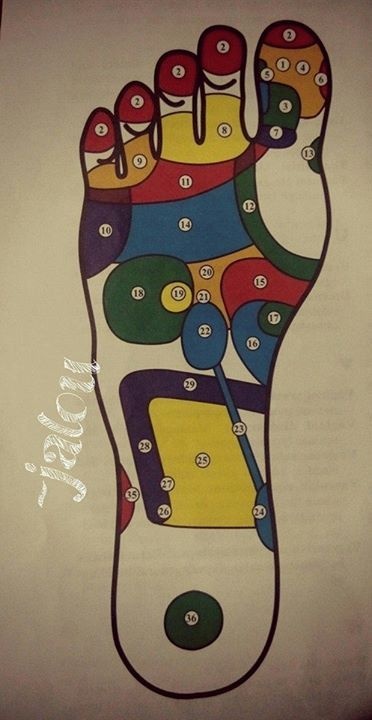
Here are some of the following illness and the corresponding reflex zone for massage:
Acne – problem of poor cleansing of the system. Massage adrenal glands; kidneys, ureters, and bladder, liver and gall-bladder.
Anemia – Massage spleen; metabolizing organs.
Asthma – Massage kidneys, ureters, and bladders.
Backache – Spine, possibly shoulder or pelvic girdle.
Burns – Lymph-points, kidneys, adrenals, ureters, bladder; parathoids.
Cataracts – Kidneys, ureters adrenals, eyes, head.
Diabetes – stomach-doudenum, pancreas.
Diarrhea – stomach-intestinal tract, lymph glands.
Epilepsy – General building up, massage head, lymph points.
Fever – lymph points, tonsils, spleen.
Gout – Kidneys, ureters, adrenals.
Hair Loss – Massage sexual glands.
Head Ache – Head
Influenza- lymph points tonsils, spleen, nose.
Nose bleeds – nose, parathyroids.
Osteoporosis – parathyroids, general building up.
Pneumonia – lungs, lymph points, adrenals.
And many more! (See the dictionary of reflexology by Benjamin Gramm [Athens, Greece GRR 10555])
For each foot, massage for five minutes on reflex areas of adrenal glands, kidneys, ureters, and bladder. Three minutes for head and neck. Two minutes for each lymph point and two minutes for some specially sensitive point.
It has been shown that, in the human body, never just one organ is weak. Since all organs are dependent upon each other, a disturbance in one will cause one another. Reflexology should not only be a treatment of symptoms but also eliminate the disturbances at their roots. Therefore, we should take care of our body so that as a whole it is working at full efficiency.

